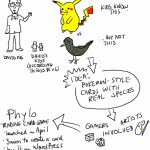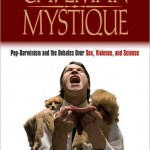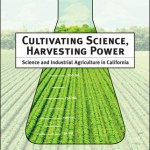Author Meets Bloggers
Last Friday and Saturday, I went to Northern Voice 2010, a gathering of 500+ individuals intent on absorbing everything that a "Personal Blogging and Social Media Conference" can muster.
And I must say, that it was a treat to be there - not only because it had a nice friendly, informal vibe which makes for great learning opportunities, but also because I was fortunate enough to be a speaker.
My first slide
Specifically, I had a chance to tell folks about the phylo project; the awesomeness of mutualistic relationships (a.k.a. the squid and the bacteria); the beauty of the scientific method;…
(Ten Best of the Decade from Half of the World's Fair)
This series began with the kindness of a friend who agreed to let me ask him about his book about Barry Commoner, science, and modern environmentalism. It then spawned a series of 17 interviews with authors of books in science studies, environmental history, the history of science, and all combinations in between. Every one of them was enjoyable to do; every author was generous and insightful. I've been able to use some of these as thumbnail sketches of readings I use in class. In that, they stand as the best example of blogging as a…
Pt. 1 | Pt. 2 | Pt. 3
---
Part 3 with Julie Sze, discussing her book Noxious New York, follows below. All entries in the author-meets-blogger series can be found here.
WF: What place did science play in the EJ issues of the communities you've studied? We've talked about tensions between expertise, technical knowledge, and lived community experience in other conversations. It's a vast subject, in fact, and I shouldn't cast this question so tidily. But for Noxious New York, where did scientific practices fit?
JS: Science played a large part in the story I told in New York City, a story…
Part 1 | Pt. 2 (below) | Pt. 3
---
Part 2 with Julie Sze, discussing her book Noxious New York, follows below. All entries in the author-meets-blogger series can be found here.
WF: Let's do this: I know we already brought up environmental justice before, but could you define it in your terms for the readers? In your use and experience, does it differ from environmental racism, does it differ from, say, an anti-toxics activism that some link to Love Canal and Lois Gibbs?
JS: That is a huge question in the book. I define environmental justice as the social movement that emerged in response…
Part 1 (below) | Pt. 2 | Pt. 3
---
The World's Fair is pleased to offer the following discussion about Noxious New York: The Racial Politics of Urban Health and Environmental Justice (MIT Press, 2007), with its author Julie Sze. Sze is an associate professor of American Studies at the University of California at Davis, an environmental justice scholar, and the founding director of the Environmental Justice Project at the John Muir Institute for the Environment.
Noxious New York "analyzes the culture, politics, and history of environmental justice activism in New York City within the…
Pt. I | Pt. 2 | Pt. 3
---
Part 3 with Martha McCaughey, discussing her book The Caveman Mystique, follows below. All entries in the author-meets-blogger series can be found here.
WF: So how is the use of evolutionary psychology to explain masculine actions not just quackery? Evolutionary biologists, and many who read science blogs, rightly announce and discredit the quackery of creationists or, more broadly, those who "deny" scientific truths. But, for the sake of argumentative symmetry, can one put that lens back onto evolutionary psychology? Besides the caveman issue, does that field…
Pt. I | Pt. 2 | Pt. 3
---
Part 2 with Martha McCaughey, discussing her book The Caveman Mystique, follows below. All entries in the author-meets-blogger series can be found here.
WF: How do you see the relationship between the academic fields of gender studies and science studies? And how has that relationship changed in the past two decades? I'm asking for a few reasons, but one of them is that I remember from graduate studies that many of the most persuasive accounts of the politics of science and technology came from feminist scholars.
MM: It's a big question, so I'll offer but a start…
The World's Fair is pleased to offer the following discussion about The Caveman Mystique: Pop-Darwinism and the Debates Over Sex, Violence, and Science (Routledge, 2007), with its author Martha McCaughey. McCaughey is a Professor of Sociology and the Director of Women's Studies at Appalachian State University.
Professor McCaughey's work fits at the intersections of gender, sexuality, science, technology, social movements, and the media. I first met her during her tenure at Virginia Tech, where she distinguished herself as a leading feminist scholar in science studies, an atypically…
Pt. I | Pt. 2 | Pt. 3 | Pt. 4
---
Part 4 with Christopher Henke, discussing his book Cultivating Science, Harvesting Power, follows below. All entries in the author-meets-blogger series can be found here.
WF: What do you make of the intersection of STS and agricultural studies?
CH: STS folks aren't often citing rural sociology, and vice-versa. I think the connections between these realms are greater than it might at first appear. Historians of science like Margaret Rossiter, Charles Rosenberg, and Deborah Fitzgerald were writing about agricultural science some time ago (as a sociologist…
Pt. I | Pt. 2 | Pt. 3 | Pt. 4
---
Part 3 with Christopher Henke, discussing his book Cultivating Science, Harvesting Power, follows below. All entries in the author-meets-blogger series can be found here.
WF: It's not just that you use Cooperative Extension as a case study of science, agriculture, and power, but that you provide some sharp detail on specific growers. In that vein, I liked your study of Spreckels quite a bit. The sugar beet grower. Could you speak to the basic arc of that case? What happens with Spreckel?
CH: The Spreckels case is actually one of my favorite parts of the…
Pt. I | Pt. 2 | Pt. 3 | Pt. 4
---
Part 2 with Christopher Henke, discussing his book Cultivating Science, Harvesting Power, follows below. All entries in the author-meets-blogger series can be found here.
WF: Now I can get back to the interpretive framework and your own concepts when understanding your empirical evidence. "Repair" is a guiding framework for you here, a way of approaching, understanding, and explaining your research findings. So what do you mean, repair?
CH: We use the term repair in everyday life to describe the process of fixing things---sociologists use repair as a…
The World's Fair is pleased to offer the following discussion about Cultivating Science, Harvesting Power: Science and Industrial Agriculture in California (MIT Press, 2008), with its author Christopher Henke. Henke is an assistant professor of sociology at Colgate University, an STS scholar, and a contributor to Colgate's environmental studies program.
Cultivating Science, Harvesting Power, says its publisher, "explores the ways that science helped build the Salinas Valley and California's broader farm industry." In doing so, Henke provides an account of "how agricultural scientists and…
Pt. I | Pt. 2
---
Part 2 with Keith Warner, discussing his book Agroecology in Action, follows below. All entries in the author-meets-blogger series can be found here.
WF: How did science and social power intersect in your study?
KW: A particularly salient feature of my field work was the divergent assumptions held by actors about the evaluation of novel practices in farming. Many advocates of alternative agriculture argue for a systems-based approach to selecting and managing technology in farming systems, and critique dominant forms of agriculture as reductionistic (or simply narrow minded…
Pt. I | Pt. 2
---
The World's Fair is pleased to offer the following discussion about Agroecology in Action: Extending Alternative Agriculture through Social Networks (MIT Press, 2007), with its author Keith Warner. Warner is a Franciscan Friar and currently at Santa Clara University, where he lectures in the Religious Studies Department, and serves as assistant director for education at the Center for Science, Technology & Society.
Agroecology in Action, says its publisher, "shows that agroecology can be put into action effectively only when networks of farmers, scientists, and other…
Click on the book cover to go to Part I of the respective discussion. Or, see here for a complete list of entries.
I: M. Egan on Barry Commoner II: C. Mody on nanotechnology
III: S. Halfon on int'l science policy IV: K. Marsh on forestry policy
V: D. Hess on social movements VI: L. Grossman on e-trash
VII: S. Parthasarathy on genetics…
Pt. 1 | Pt. 2 | Pt. 3
- - -
Part 3 with Gregg Mitman, discussing his book Breathing Space, follows below. All entries in the author-meets-blogger series can be found here.
WF: Following that--or perhaps too similarly--I see that the book has been reviewed widely, suggesting a diverse range of readers. But who did you want to write it for?
GM: The book is meant to be a crossover book. By that, I mean it was written to appeal to scholars and students in environmental history, medical history, history of science, and historical and cultural geography, and also to a more general readership…
Pt. 1 | Pt. 2 | Pt. 3
- - -
Part 2 with Gregg Mitman, discussing his book Breathing Space, follows below. All entries in the author-meets-blogger series can be found here.
WF: Given the class issues you deal with, the book is also a contribution to the history of environmental justice. How would you characterize environmental justice and issues of health?
GM: I think it is difficult to separate out issues of environmental and social injustice. When you combine inadequate access to health care, for example, with increased exposure to air pollution caused by the siting of bus depots in…
Breathing Space: On the Historical Connections of Allergies and Landscapes, with Author Gregg Mitman
Part 1 | Pt. 2 | Pt. 3
- - -
The World's Fair is pleased to offer the following discussion about Breathing Space: How Allergies Shape Our Lives and Landscapes (Yale University Press, 2007), with its author Gregg Mitman. Prof. Mitman is Interim Director of the Nelson Institute for Environmental Studies and William Coleman Professor of History of Science at the University of Wisconsin-Madison. He is also a professor in the Department of Medical History and the Robert F. and Jean E. Holtz Center for Science & Technology Studies.
If you were to ask how one could hold together so many…
Part 1 | 2 | 3 | 4
- - -
Part 4 with Jody Roberts and Michelle Murphy--discussing her book Sick Building Syndrome and the Problem of Uncertainty--follows below. All entries in the author-meets-blogger series can be found here.
- - -
WF: The book is titled "Sick Building Syndrome and the Problem of Uncertainty." Why is uncertainty a problem? Or, perhaps we should ask, where or when is uncertainty a problem?
MM: Uncertainty, I would suggest, is a constitutive feature of much environmental politics, and particularly chemical exposures. Legal standards that demand we know the predictable…
Part 1 | 2 | 3 | 4
- - -
Part 3 with Jody Roberts and Michelle Murphy--discussing her book Sick Building Syndrome and the Problem of Uncertainty--follows below. All entries in the author-meets-blogger series can be found here.
- - -
WF: Racism is a word that generally makes us feel uncomfortable, especially when it's linked to politics or science. When I've introduced the term in courses I've taught (using your writings) my students get visibly uncomfortable. It's not the case or the injustices that sets them off - they tend to agree with much of what's said - but they have a very…


